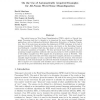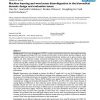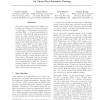23 search results - page 4 / 5 » An End-to-End Supervised Target-Word Sense Disambiguation Sy... |
ICTAI
2009
IEEE
13 years 12 months ago
2009
IEEE
Knowledge plays a central role in intelligent systems. Manual knowledge acquisition is very inefficient and expensive. In this paper, we present (1) an automatic method to acquire...
JAIR
2008
13 years 5 months ago
2008
This article focuses on Word Sense Disambiguation (WSD), which is a Natural Language Processing task that is thought to be important for many Language Technology applications, suc...
BMCBI
2006
13 years 5 months ago
2006
Background: Word sense disambiguation (WSD) is critical in the biomedical domain for improving the precision of natural language processing (NLP), text mining, and information ret...
COLING
2008
13 years 6 months ago
2008
Supervised approaches to Word Sense Disambiguation (WSD) have been shown to outperform other approaches but are hampered by reliance on labeled training examples (the data acquisi...
JMLR
2012
11 years 7 months ago
2012
Open-text semantic parsers are designed to interpret any statement in natural language by inferring a corresponding meaning representation (MR – a formal representation of its s...



